




Noventum Power Limited is one of the leading large-scale renewable energy companies in the UK






Noventum Power Limited is one of the leading large-scale renewable energy companies in the UK
We will work with you, helping you towards developing your land into an income generating asset that can provide additional income streams for your business.
The benefits include:
•Diversifying revenue streams away from farming or other land uses
•Deploying solar power or wind turbines on your available land


•Maintaining agricultural use through sheep grazing when possible
We are looking for sites between 50 acres and 200 acres, ideally close to a nearby grid connection Land should be relatively flat and Grade 3 or lower
Well screened by hedges and a good distance from residential property
Not in a valued landscape or near historic buildings
We have a team of experienced, highly proficient renewable energy experts. They have an extensive record which encompasses the following:
Land Acquisition
Investment
Construction
Energy Storage
Planning and Permitting Grid Solutions
Power Engineering & Grid Connections
Operation and Maintenance
If you would like to discuss how to potentially earn a secure and long-term predictable income stream from your land, please get in touch and contact us on:
89562
EDITORIAL
Editor:
Johann Tasker | T: 07967 634971
E: johann@ruralcity.co.uk
Design:
Mark Shreeve | T: 01502 725839
E: mark.shreeve@micropress.co.uk
Advertisement production:
Jade Soanes | T: 01502 725840
E: jade.soanes@micropress.co.uk
ADVERTISING SALES
Chloe Miller | T: 01502 725844
E: chloe.miller@micropress.co.uk
Danny Lewis | T: 01502 725862
E: danny.lewis@micropress.co.uk
Mat Roffey | T: 01502 725854
E: mat.roffey@micropress.co.uk
Mark Tait | T: 01502 725803
E: mark.tait@micropress.co.uk
Sometimes you wait ages for a reason to join an agri-environment scheme – and then 23 good reasons come along at once. At least that's what the government is hoping.
The 2023 iteration of the Sustainable Farming Incentive (SFI) includes 23 new options for farmers to look after the environment while producing food sustainably.
Launched to much acclaim by Defra farm minister Mark Spencer last month, the government hopes the scheme will prove attractive to those farmers who have so far left it well alone.

About 3,300 farmers signed up to the 2023 SFI. But way more are needed if Defra is to achieve its target of having 70% of farmers in the scheme within the next few years.
nutrient management, farmland wildlife, buffer strips, and low input grassland.
When adopted at scale, these actions will support sustainable food production and contribute towards the government's environmental Optimising the use of nutrients, for example, will not only reduce carbon emissions but can also reduce farmers’ costs. But the scheme is less light touch than many thought it would be. Witness the 156-page handbook accompanying the launch.
The NFU rightly says Defra has to get the scheme correct. Applications for SFI 2022 have now closed with Defra promising a “smooth transition” for the 3000 or so farmers who applied.
Midland Farmer is a controlled circulation magazine published monthly for farmers and growers in the Midlands (Derbyshire, Herefordshire, Leicestershire, Lincolnshire, Northamptonshire, Nottinghamshire, Shropshire, Staffordshire, Warwickshire, West Midlands and Worcestershire) or companies supplying goods and services to the sector. To be included on the circulation list, a farmer must have a minimum of 70 acres of land, or 50 dairy/beef stock, or 50 breeding sows/250 growing stock, or 15,000 laying hens/broiler chickens. Intensive horticulture units are required to have a minimum of two hectares.
If you no longer wish to receive this magazine, please email your name, address and postcode as it appears on the wrapper to adam.gunton@micropress.co.uk
© Countrywide Publications 2023
Published by Countrywide Publications, Fountain Way, Reydon Business Park, Reydon Suffolk IP18 6DH

T: 01502 725800
Printed by Micropress
Printers Ltd T: 01502 725800
On paper, it looks attractive.
Farmers will get paid for taking actions that improve farm productivity and resilience, while also protecting and improving the environment.
Additional actions under SFI 2023 will help ensure there is an offer that is attractive and workable for all types of farms, says Defra.
The 23 actions on offer cover existing themes including soil health and moorland, as well as new actions on hedgerows, integrated pest management,
This process will need to align with the roll out of the SFI 2023 offer. The NFU says these farmers must be treated fairly during the transition, should they wish to take up a 2023 agreement.
If the SFI and the wider environmental land management scheme is to be successful, it must be simple, flexible and provide certainty to secure widespread uptake.
That means farmers must be properly rewarded – otherwise the scheme will fail to meet its goals of benefiting farm businesses and the environment.
Johann Tasker EditorPlans to pay farmers more for looking after the environment have been welcomed – amid warnings that early adopters must not be unfairly penalised.
Improvements to Defra’s Sustain able Farming Incentive (SFI) mean farmers who sign up to the scheme this year will have more options to choose from than farmers who joined last year – and more opportunity to boost their income.
Some 23 options on offer cover ex isting themes including soil health and moorland – as well as new actions on hedgerows, integrated pest management, nutrient management, farmland wildlife, buffer strips and low input grassland.
It means farmers could be paid £10 per 100m for managing one side of a hedgerow (plus a further £10 per 100m to maintain or establish hedgerow trees); £129 per hectare for multispecies cover crops; or £589 for a nutrient management review.
Farm minister Mark Spencer said: “After listening to extensive feedback from farmers, we’ve done a huge amount to streamline and improve the Sustainable Farming Incentive, making it as simple and flexible as possible for farmers.”
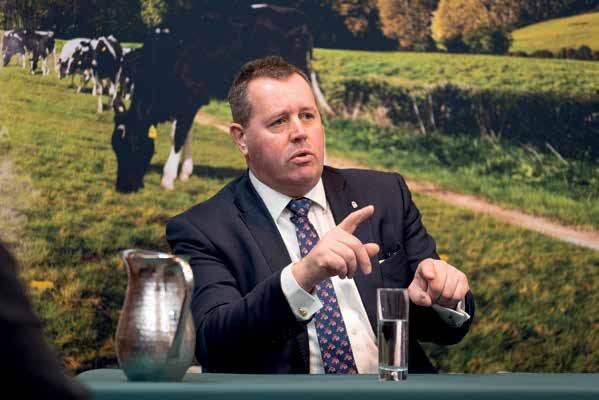
“We want farmers to be able to access a package that works best for them. The scheme will remain flexible to allow for the changing needs and requirements of farmers and their markets to ensure the best outcomes for food production and the environment.”
The government has also confirmed
the SFI management payment will be applied to all land-based SFI actions, including moorland, and has updated the payment rate for low input grassland action to make the rates the same for upland and lowland areas.
For tenant farmers, there are shorter agreement lengths that do not require landlord consent. This makes payments more accessible to those on short-term agreements, and includes
The 2023 scheme will open to applications from August. Defra says it will contact the 3000 or so farmers who joined the SFI in 2022 to explain how they can access the payments, benefits and improvements in the 2023 offer.
NFU vice president David Exwood praised the improvements. But he added: “Given their early commitment and the lessons learned, these farmers must be treated fairly and rewarded during the transition, should they wish to take up a SFI23 agreement.
“Defra has to get this right. If SFI and the wider Environmental Land Management scheme is to be successful, it needs to be simple, flexible and provide certainty so there’s wide-
Country Land and Business Association president Mark Tufnell said the changes showed Defra was committed to responding to feedback from farmers, helping to ensure the scheme works for as many businesses as possible.
But he said it was a pity that the transition process could not have been smoother for early adopters. He added: “We will press Defra and the Rural Payments Agency to ensure further procedural improvements are made where necessary.”
Farmers face a hike in levy rates to address the impact of rising costs at the Agriculture and Horticulture Developoment Board.
With agriculture facing unprecedented pressures, including inflation and the reduction in the Basic Payment Scheme, services provided to support levy payers are becoming more important than ever, says the AHDB.
Conversations will be held with key industry stakeholders and levy payers during the coming months. A formal consultation will take
place this autumn. If approved, new rates could be implemented from April 2024.
Levy rates have remained broadly the same since 2011. Although the AHDB says it has made significant savings have been made, it warns that rising costs are continuing to add pressure on its budget.
AHDB director Will Jackson said: “There is never a right time to be recommending a levy increase, but we believe the current economic climate makes the case more urgent with clear, tangible benefits.”
Time, a commodity that you can only use once, cannot borrow or lend or store in a cupboard for a rainy day.

Timing is crucial within the drainage game, sometimes it can be the difference between an average crop or a good crop, or in this case racing or not racing. Cheltenham racecourse, a site we have worked at many times over the years is one such place where timing of any drainage installation is key. The course like us to start as soon as possible after the last race meeting, to allow the ground time to knit and heal after the drainage has been installed and give the ground staff time to work their magic getting the course ready for the first meeting of the new season, just a few months later.


It is the same at harvest. Timing and planning are crucial as harvest begins with most around the same time, give or take a week or two. Throw in harvesting speeds, how many acres, crops being harvested and the weather, it all takes a bit of a juggling act to keep everyone and everything on track and running smoothly, timing is key.
As with all best laid plans they sometimes never run how you would hope they would, for instance this year around by us, hay making is a couple of weeks early due to the recent warm weather. Farmers who would usually have a majority of hay over haylage now have a majority of haylage over hay. Again, time and weather playing their parts. If it stays warm and dry much longer the harvest may be brought forward also. If it is then there will be the knock on effect and we are already looking at our schedule as we work to avoid putting some clients off until after harvest. . . Only if there were 25 hours in an 8 day week!! Then you get the late arrivals who call as the combine is just finishing on a Monday, asking for a price and if we can start on Tuesday as they want to drill it Wednesday. . . .we think we manage our time very well but stopping time and time travel are both still a work in progress!
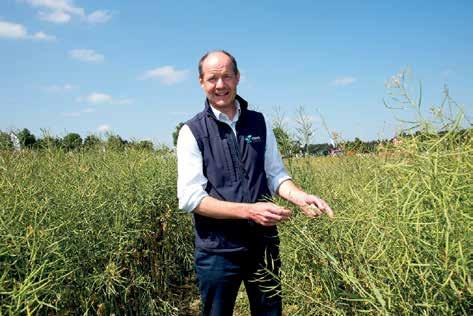
Glorious sunshine welcomed the crowds along to one of the Midlands’ largest annual agricultural events.
The ninth annual Arable Event wa sheld at Weston-Under-Lizard on 7 June on the Shropshire-Staffordshire border. It was a day packed full of expert demonstrations, specialist talks and technical seminars.
The one-day event was jointly organised by Wynnstay and GrainLink at the Bradford Estates’ Woodlands Farm, and included a free moisture clinic, trial crop tours and a guest speaker tent.
Event organiser Kelly Dolphin said: “It was fantastic to see so many people enjoying the fabulous weather. The Arable Event is a great way for people in the farming industry to meet, try out the latest machinery and learn about new trends and innovations.
“We ran several specialist tours



of our trial plots throughout the day which were well received, and early feedback has been really positive.”
The event included talks from Mark Tripney of LKAB Calicifert on soil health, Ryan Wooley from Morris Lubricants and Charlie Ireland from Ceres Rural, who has become a wellknown face following his involvement in the hit TV series Clarkson’s Farm.
Mr Ireland said: “It’s been brilliant coming out to meet local farmers. Events like this are really important because arable farming is constantly evolving and changing.
“It’s essential to meet up, share experiences and keep up with the latest innovations. It’s been fantastic to see such a great turnout.”
The day also included guided specialist tours of trial plots planted by Syngenta and Wynnstay. These
included a full range of winter and spring wheat, barley and oats in both fungicide treated and untreated scenarios.

Woodlands Farm is part of Bradford Estates and is operated by Bradford Farming, which is establishing the largest regenerative farm in the West Midlands and a centre of farming excellence.


Healthy crops. Nourishing soil. Thriving habitats. Now and for future generations. We know what the custodians of our land want – because you’ve told us, through decades of working with you.
Our MOREwoods and MOREhedges schemes offer up to 75% funding for treeplanting projects, and we’ll be there with you to help transform and diversify your business, giving us all a healthier future.



woodlandtrust.org.uk/plant




MOREwoods is funded by
• Timing on declaration important
• Advice on bends and cover crops
• Funding raised creates varieties
Payment rates have been agreed for farm-saved seed and the latest list of eligible varieties.
With 2023 spring declarations under way, the British Society of Plant Breeders said it was also publishing advice on blends, cover crops and what farmers should do in the event of a failed crop.

BSPB chief excecutive Sam Brooke said: “Since the launch of our online returns site in 2021, we have seen an encouraging increase in on-line farm saved seed declarations – [but] there is still some confusion around what to declare.
“We wanted to clarify the requirements – especially the need for all protected varieties to be declared regardless of whether they are part of a blend, cover crop or failed crop.”
It is a requirement for all farm saved seed to be produced and sown on the same holding. This prohibits the sharing or sale of seed between growers.
The declaration of any protected variety should be made when the seed is sown.
Ms Brooke said the BSPB was keen to remind growers that yield – and whether the variety is part of a blend or cover crop – does not affect the need to make a declaration.
“Farm saved seed declarations apply to cover crops, volunteer crops, companion crops, whole crops and bicrops, regardless of yield,” explained Ms Brooke.
“In the case of a failed crop, such as oilseed rape, the seed declaration is still required because payment is due on sowing not harvest. It is ille-
gal to sell, buy, barter or share farm saved seed.”
Where a blend or cover crop that includes a protected variety is sown, the grower must declare the ratio of seed in the blend. This percentage can be used in conjunction with the seeding rate to calculate the payment needed for using the blend.
Growers are also advised not to save seed from hybrid varieties as this will lead to variable offspring, reduced yields, loss of agronomic characters and is against the law.
“It is important that growers remember that all blends, cover and volunteer crops could potentially have a variety that requires them to make a
Seed declarations must be made on all eligible varieties regardless of yield and whether the variety makes up part of a blend or cover crop.
declaration. Saving seed from hybrid varieties is not advised and must be avoided to protect future yields.
“If there is any uncertainty the BSPB team is on hand to help and offer guidance on how to calculate and declare all varieties of farm saved seed.”
The BSPB says funds raised through farm saved seed declarations help breeders invest in improved varieties better suited to their growing conditions. “By completing your declaration, you are helping plant breeders help you,” it says.
For full details, visit returns.bspb.co.uk
The Agriculture and Horticulture Development Board has published the 50th anniversary edition of the RB209 Nutrient Management Guide.
First published as Reference Bulletin 209 by the Ministry of Agriculture, Fisheries and Food (MAFF) in 1973, the guide was the first comprehensive set of fertiliser recommendations for major crops.
Now published by the AHDB, the latest edition features many improvements, including numerous changes to recommendations for cereals. Hard copies are available and the guide can also be downloaded.
‘Notable changes’
AHDB senior environment manager Amanda Bennett said: “The 50-year edition includes notable changes to the recommendations for
oats and key considerations for nitrogen management for milling wheat.”
The AHDB compiles the guide in partnership with many external parties and farmers, who participate in the UK Partnership for Crop Nutrient Management Steering Group and three sector technical working groups. Nitrogen rates for oats, for example, are now based on expected yield.
Alli Grundy, an independent adviser and chair of the RB209 arable technical working group, works with approximately 25 experts to examine data from across the sector to improve the guide – and its usability.
Ms Grundy said: “This backing means growers can be assured that the information is scientifically robust, providing the evidence needed to support decision making on the farm.”
The pinnacle event in the British agricultural calendar, the Royal Welsh Show takes place from 24th–27th July 2023 in Llanelwedd, Builth Wells.
Each year the Royal Welsh Show attracts hundreds of thousands of visitors to the heart of Mid-Wales to come together and celebrate the very best of Welsh and British agriculture. The Show is an action-packed four-day event of exciting competitions, livestock, forestry, crafts, countryside sports, shopping, food and drink, a 12-hour programme of non-stop entertainment, displays and much more.
For more information about this year’s Royal Welsh Show, or to purchase tickets visit www.rwas.wales or www.cafc.cymru


For use against flying and crawling insects and stored product insects such as saw-toothed grain beetle, grain weevil, red-rust flour beetle, flour moth and grain mite. For use in empty grain stores, industrial buildings and food handling/storage/manufacturing premises.











Agrovista has pledged to donate 10% of seed sale profits from its new winter wheat variety Mindful to two farming charities.
Mindful is a new hard Group 4-type wheat from Agrovista Seed. The variety has achieved high yields of quality grain across a range of sites over different seasons, helping to underpin grower profits across the country.
Sales of Mindful seed will support the farming community in another way too – building on a partnership forged between Agrovista, the Farming Community Network and Scottish charity RSABI last year.
Agrovista head of marketing Jodie Champion said: “Given the unprecedented challenges the agricultural sector is facing, we wanted to help farmers and their families access the emotional and practical support that both charities provide.
Many farmers face increasing business and personal pressures that could

seriously affect mental and physical wellbeing if left unchecked, said Ms Champion
She added: “It is vital that those involved in agriculture and their families have access to a sympathet ic person at the end of the phone who understands farmers and rural life.
“Our donation will support the exceptional work that both chari ties carry out every day. But, more importantly, we hope that by exten sively promoting the charity helplines, this may just help one person out when they need it most.”
When it comes to in-field performance, Mindful has shown high-yield consistency and topped in-house trials in two very different years, said Agrovista technical seed specialist Stuart Cree.
“Mindful offers a consistently strong yield performance across differing regions and drilling dates, and
• A vertically standing, crop cooling and conditioning system.

• Draws heat out of floor stored crops, helping to maintain crop quality and price.
• Cost effective and flexible solution that ensures crops stay free from moulds and insects.

• Recommended for small seeds like Oil Seed Rape.
• No need to have an additional filter for small seeds.
• Louvred slots are less likely to block so equal air distribution is maintained through the crop.
after a range of previous cropping and as a second wheat.”
Mindful produced the best mean yield across Agrovista’s AgX trial sites in 2021 and 2022 at both extremes of the sowing window. Drilled last September, it produced 14.89t/ ha. A late sown crop drilled in November the same year yielded 15.44t/ha.
Mindful achieved a two-year mean yield of 13.15t/ha at the Agrovista AgX site at Haddenham, Cambridgeshire. The variety combines disease resistance ratings, suggestive of multi-gene protection derived from parents Evolution and Costello.
Trials carried out as part of National List trials placed Mindful in the top three yielding varieties when sown after peas or cereals pre-ploughed before 25 September, said Mr Cree.

The Farming Community provides free confidential support to anyone in agriculture seeking help for personal or businessrelated issues.
The FCN helpline can be reached on 03000 111 999 (7am-11pm, 365 days of the year). For details, visit www.fcn.org.uk
• British Manufactured, built to last.
- Cast Aluminium Case
- Pressed Steel Impeller
- Thermal Overload
- Class leading air flow

• Our fans used on UK farms for over 50 years.
• Used in grain stores worldwide.
See us at Agri Expo -March 7th
•INDUSTRIAL, AGRICULTURAL OR COMMERCIAL TERNAL OR EXTERNAL

•STEEL FIXING
USH,
AND COSTING
•SILO BASES
PRONS &SHED FLOORS









•ANAEROBIC DIGESTION




























TANK BASES







•GRAIN, POTATO& MACHINERYSTORES

•PATHS, PATIOS AND DRIVEWAYS
•GROUNDWORKS & PREPARATION







Early maturing soft wheat Bamford is generating strong support from the trade on the back of promising National List trials.
Bamford has a treated yield of almost 106% supported by an untreated yield of 92%.
With a score of 7 for septoria tritici and strong disease resistance to both mildew and yellow rust, it is expected to be included on the 2024 Recommended List.
The high yielding Group 3 winter wheat ticks all the key boxes, says Laura Beaty (right), seed grain director at McCreath Simpson and Prentice (MSP). It has wide marketability with potential to be a key variety in the distilling market, she says
Both yield figures are higher than other varieties in the same class, adds Ms Beaty. “Bamford looks to be one of the most exciting varieties going forward. It looks robust and should attract growers from all regions within the UK.”.
Harvest spread
Having seen positive reports on the variety's alcohol yield and residue viscosity conducted by the Scottish Whisky Research Institute, Ms Beaty says she can already see Bamford’s commercial promise for distilling.
On maturity, Bamford’s +1 rating fits nicely between Skyscraper and many of the other soft wheats that carry a very early +2 score. Its ability to bridge that gap could growers spread their harvests.
“The next stage will be to await the variety's entry onto the next recommended list before we place it with key growers to further evaluate its performance more closely in real farm situations” says Ms Beaty.

Andrew Bourne, seeds manager for independent merchant T Denne & Sons, has been following Bamford’s progress through National List trials. Bred by UK-based Elsoms Seeds, it has the potential to be a key variety, he says.
“I specifically remember the trials manager singling it out as ‘one to watch’ and you have to make an important mental note in those situations, given that it wasn’t their own variety.
“The 7 for Septoria is a stand-out statistic. But when you look at Bamford’s parentage and realise that it’s a Moulton cross, not a Cougar cross, then the genetic sums begin to add up.
“We still have a lot of growers with KWS Zyatt and RAGT Skyfall. Both are good yielders but with high susceptibility to yellow rust. Bamford’s 7.8
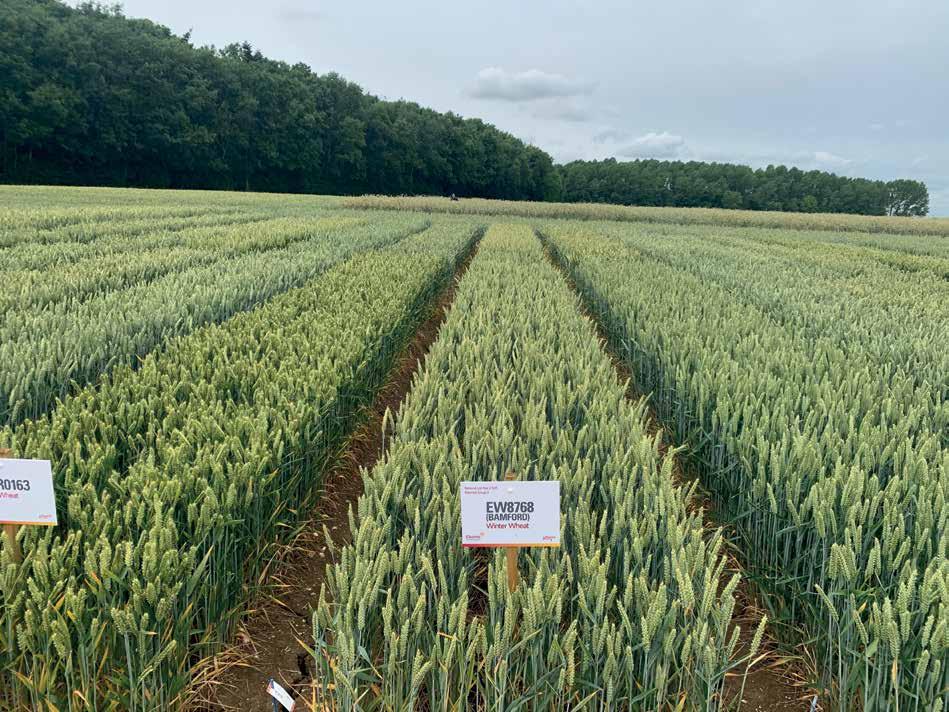
score for yellow rust, combined with its very high yield, could make it a popular choice for the south.
On out-and-out yield, Mr Bourne says Bamford challenges the best Group 4 varieties – and could become another Riband or Consort, two highly successful varieties from the Plant Breeding Institute programme in the 1990s.
“Neither were the most popular varieties because they were Group 3s – but they simply had that perfect combination of high yield, excellent disease resistance and consistency,” says Mr Bourne.
As the most competitive Group 3 variety at this stage in its develop ment, Bamford has the potential to become one of the most competitive and marketable soft wheats avail able with suitability for biscuitmaking, export and distilling.
“With that kind of market flexibility, it certainly looks to be one of the most exciting National List candidate vari eties this year,”
Bamford challenges the best Group4 winter wheat varieties on yield
It looks to be an exciting new variety
The benefit of tackling take-all has been highlighted by a seed-treatment trial. The soil-borne pathogen Gaeumannomyces tritici is ever present in UK arable soils – building to yield-robbing proportions when a second, third or even fourth cereal is grown.
At its most damaging on light, sandy soils, take-all can cause yield losses of up to 50% in winter wheat, with crops increasingly affected as the UK climate warms.




















































This increases the need for protection against the disease where there is risk – and research conducted last year by ADAS reinforces this argument, says Certis Belchim seed treatment specialist Adam Nears.
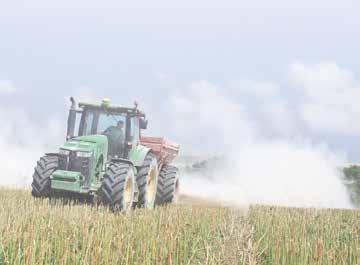
The fully replicated trial was carried out by ADAS plant pathologist Chloe Morgan. It tested four different winter wheat varieties, each treated with a single purpose dressing (SPD), or SPD plus Latitude (silthiofam) seed treatment.

Results showed selecting the right variety can reduce the impact of take-all on the











crop, with plant assessments in the SPD-on ly treatments showing less severe root dam age on Palladium than Extase, for example.
At harvest, yield results showed a clear benefit from Latitude – the only fungicide approved for the control of take-all – in all four varieties. Extase produced 1.9t/ha ex tra with Latitude, Palladium 0.9t/ha, and the average response across all trial varie ties was 1.4t/ha.






“Our Latitude Cost Benefit Calculator as sumes a more modest 0.55t/ha response, taken as a medium risk average from many years’ of trials.











“With treatment costing about £230/t, harvest 2024 wheat futures at £200/t, and assuming a seed rate of 250kg/ha drilled in mid-October, the online tool shows that just 0.28t/ha is needed to cover treatment cost, delivering a respectable margin of £53.75.”








Miss Morgan is running a similar trial in 2023 and after first visual assessments in plots, take-all symptoms are not as obvious this year.



Growers should look for takeall signs this month and next, says Chloe Morgan


She suspects this is down to infected plants having easier access to water and nutrients, unlike last year when drought exacerbated symptoms, resulting in stunted plants, bleached ears known as “white heads” and early senescence.
explaining her thoughts, Miss Morgan says: “Data from last year’s trial showed that where planting second and consecutive wheats, the use of Latitude seed treatment is a useful risk management strategy to protect against yield loss.”

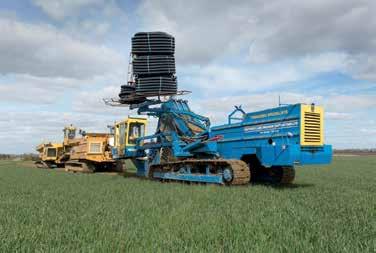


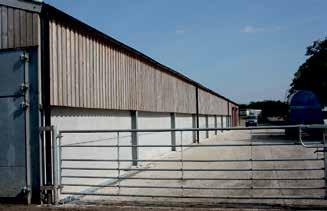


Mark Jelley of Brixworth Farming in Northamptonshire has been crowned Syngenta Farm Sprayer Operator of the Year.
Announced in the Sprays & Sprayers Arena at last month’s Cereals event, the annual award recognises and rewards the skills and expertise of the UK’s top farm sprayer operators.

Mr Jelley has been operating sprayers for 45 years. He uses a state-of-the-art Chafer Interceptor self-propelled sprayer across 1,500ha of combinable crops on Brixworth Farming’s own land, plus an additional 500ha of contract farming.
Judges praised Mr Jelley’s willingness to help improve the skills of his colleagues on the farm – included sharing information and best practice to ensure they all work in the same way, generating better results.
“Having been a previous finalist, I was keen to give it another go,” said Mark. “It’s a good
learning experience – entering the award is a good way to measure and further your knowledge, and to keep on learning.”
Syngenta application specialist Scott Cockburn, who organises the annual competition, said: “In one of the largest entries in recent years, this year’s finalists highlighted that experience counts because all of them had made the shortlist before.
“Everyone in the industry is aware of how plant protection products are under constant scrutiny. That’s why highly skilled, qualified and expert operators, who take seriously their continuous professional development, hold such an important position on farms.”
The competition has shone a light on best practice for more than 30 years. During that time, there have been big advances in equipment and technology. But it still takes skill and knowledge to en-
Award winner Mark Jelley has been operating sprayers for 45 years.
sure products are applied accurately, safely and efficiently.
Judges assess operator skills, rather their machines and stores. “That’s illustrated by this year’s wide variety of equipment being employed by the finalists. It is, however, now noticeable how many farms, of all sizes, are now investing in modern filling areas, stores and water handling facilities.”
Other commended finalists included Peter Dennis of
Sternberg Farms, Tenterden, Kent. With more than 40 years of spraying experience, he operates a John Deere R962i, treating 1,000ha of combinable crops.
Another previously short- listed finalist was also in this year’s line-up. Chris Hosking, is lead operator at Varfell Farms near Penzance, Cornwall.
Mr Hosking is responsible for crop protection applications on 1,600ha of land, including 41 million bunches of daffodils.
Great British Pea Week – the annual campaign to promote vining peas – takes place on 3-9 July this year. Organised by the Yes Peas! campaign, the celebratory seven days aims to inspire consumers to eat more peas.
The UK is about 90% self-efficient in pea production, with the British pea industry harvesting 160,000 tonnes of the specialist crop for freezing each year.
The eight-week harvest sees growers and contractors work around the clock to harvest, shell and transport peas from field to factory as quickly as possible – with most crops making through the freezing process in under two-and-a-half hours.
Great British Pea Week champions the 700 pea farmers around the country who work within 16 different grower groups to ensure that Great Britain remains Europe’s largest producer and consumer of frozen peas.
Holly Jones, of the British Growers Association, said growers were rightly proud of the crop. “Nearly all peas in supermarket freezers are most likely grown by British farmers on a British farm.”
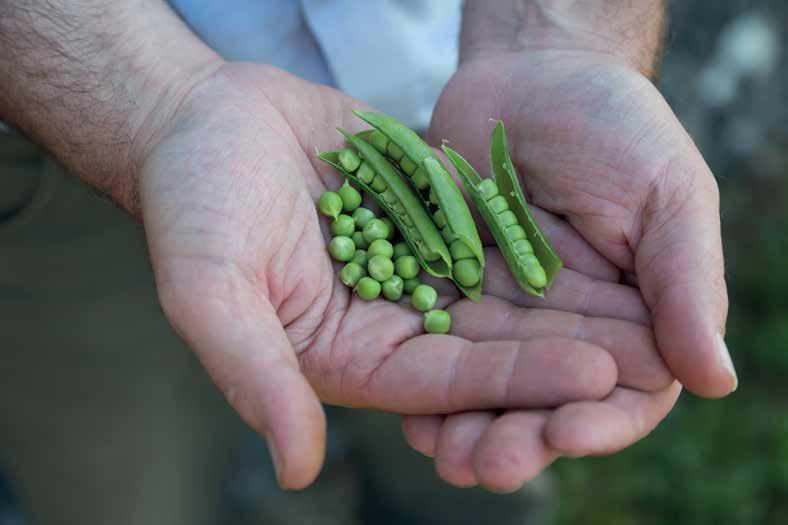
Some 160,000 tonnes of peas are harvested annually for freezing
Our varieties undergo 10 years of UK testing before 3 years of Animal and Plant Health Agency Variety trials for UK and Northern Ireland to confirm value for cultivation and use.
With more extreme weather and regional variation choose robust, resilient varieties for 2024 sowing. All varieties are rhizomania tolerant, and in addition Jackdaw is tolerant to Beet Cyst Nematode and Osprey to the more aggressive AYPR rhizomania. All are available with our own proven pellet technology and quality.



Wren, Adder, Osprey and Tawny are also on the BBRO Recommended List.





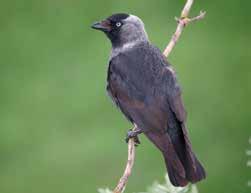
Hybrid rye has significant agronomic advantages over other crops – with a potential UK market that could double in the coming years, say seed suppliers.

Some 50,000ha of hybrid rye are currently grown in the UK. But opportunities in pig and poultry diets and the distilling sector mean there is no reason why that area shouldn’t increase to 100,000ha by 2028, says Nigel Walley, national seeds manager for Agrovista.
Mr Walley has been commercially involved with hybrid rye since the crop established itself as a key energy source for anaerobic digestion several years ago. The agronomic benefits of rye in the rotation are clear, he says.

“Hybrid rye is an excellent choice for growers,” says Mr Walley.
The crop is flexible in the rotation and can be drilled early or late, helping to spread harvest. Other benefits include lower seed rates, rapid spring growth, exceptional water efficiency and an aggressive root system that can scavenge for moisture and nutrients.
These benefits can help growers bolster profit margins by reducing input costs. Hybrid rye requires about half the fertiliser of a second wheat and has far less susceptibility to take-all
to combat any brown rust. Some 40% should be applied by growth stage 25 with the remaining 60% at growth stage 37, he adds.
With most hybrid rye currently grown as wholecrop for anaerobic di gestion, seed breeders are developing new, higher yielding varieties that meet the right physical and nutri tional qualities specifically required by the distilling and pig feed sectors.
Agrovista has a key partnership with German breeder Saaten Union and their UK partner Elsoms Seeds. Winter rye varieties, such as SU Per former, regularly exceed 50t/ha when harvested wholecrop. Newer vari eties, such as SU Arvid, are well suited to UK con ditions.
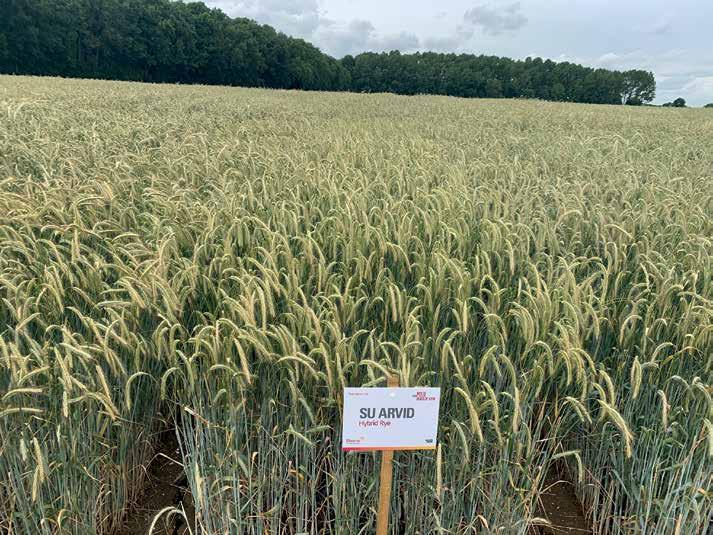
“Both SU Performer and SU Arvid offer flexible drilling dates and con sistently high yields, even when drilled in late November. Both varie ties have low susceptibility to lodging but you may still need a Plant Growth Regulator for insurance in very fertile conditions.”
Saaten Union cereal product manager Andrew Creasy agrees that the planted area could double within the
Elsoms seed specialist Emily Pick sees a strong future for hybrid rye based on the pipeline of new SU candidate varieties and established SU varieties already.
Of 11 hybrid rye varieties on the current descriptive kust, six are from breeders Saaten Union, They include SU Baresi, SU Arvid and SU Perspectiv, all of which continue to receive significant interest from growers.
With its excellent disease resistance to brown rust, SU Baresi has performed well in both trials and
Breeders
ture was clearly demonstrated in the trials with several SU varieties still achieving fresh weight yields of over 60t/ha.
“If that 2022 summer was to be replicated regularly, then I can see a strong long term sustainability argument for growing more rye. However, the key to unlocking more growing area in the short-medium term is establishing new markets.”
Another potential new market could be bioethanol production, says Mr Creasy. “Although wheat is still the primary source for this, rye could do the job equally well – if not better –given its lower inputs versus wheat.”
real farm situations, says Ms Pick. It has recorded a specific weight of 78.2kg/hl and achieved gas yields 6% higher than controls.
SU Arvid has continued to exhibit the highest fresh weight output amongst all varieties in UK trials, adds Mr Pick. Meanwhile, SU Perspectiv has shown yield consistency in cooler, less volatile growing conditions in Scottish trials.
“With good disease scores and excellent lodging resistance due to its lower plant height, it looks a strong addition to the portfolio.”
Summarising yield performances in the wholecrop trials, SU Arvid was the dominant variety. It consistently yielded 5t/ha more than SU Performer and 1.5t/ha more than SU Baresi. On further analysis, SU Arvid was also the top performing variety
“In terms of new candidate varieties for the next Descriptive List, SU Perspectiv achieved higher yields in on-farm trials in both northern England and Scotland – and looks to be one to follow as a high yielding grain variety with potential for the distill-


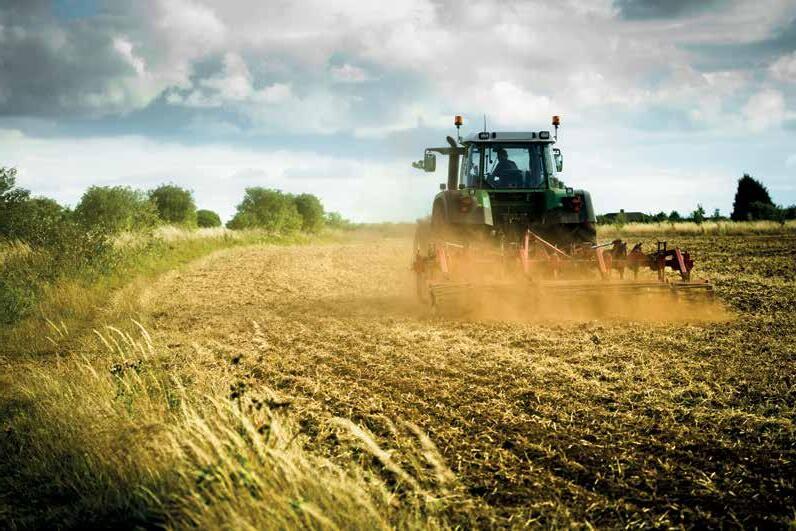

An independent recycling scheme is offering growers and livestock producers a stressfree way to dispose of farm plastics.
The Green Tractor Scheme brings together companies which collect plastic waste from farms. And unlike some collection companies, they ensure the waste can be reprocessed back into usable plastic.
Rules and legislation requiring farmers to dispose of plastic responsibly rather than burning or burying it have been in existence since 2005. But not all plastic collection companies recycle plastic waste in the proper way.
“It’s an increasing challenge for farmers who are under more scrutiny to prove they are doing the right thing,” says Green Tractor brand champion Joe Farmer. Farmers need to ensure their waste is being recycled – or run the risk of being caught out, he adds.

“A waste transfer note is supposed to be the legal proof that waste has been transferred the correct site. But
sometimes the tonnages don’t add up –which means some farmers aren’t doing all the recycling they’re supposed to be doing.”
Since inception, the Green Tractor Scheme has diverted close to 41,000 tonnes of farm plastic from being sent to landfill. To make this possible, the scheme has serviced on average 17,500 farmers each year.
“We try to keep things simple,” says Joe. “We try to ensure the agricultural community is at the heart
• An assurance that any waste collected is fully, legally traceable and accredited.
• All Green Tractor collectors are annually accredited.
• No hidden fees.
• Use the Green Tractor Scheme badge to show a commitment to positive change.
• Indemnity from fines regarding mishandling waste management by ensuring your waste is handled correctly.
of every decision we make. We are as transparent as possible and we don’t charge extra levies on top of the recycling price.”
To use a Green Tractor accredited collector, farmers simply visit the Green Tractor website. They then choose a suitable waste collector nearby from a list of companies which are part of the scheme.
“It’s completely the decision of the farmer,” explains Joe. “They can contact whoever they like – and they can also compare prices because each collector is independent and may have a slightly different pricing structure.”
“Accredited collectors then collect the plastic waste from the farm. The plastic is then reprocessed by the waste collector ready for the next step of the recycling process.
The Green Tractor head office is in Lincolnshire. The directors each have their own company – Agri.Cycle, Grassroots Recycling, Solway Recycling and Emerald Isle Recycling –but there are member companies too.
“Our scheme is national and we have coverage across England, Scotland, Wales and Northern Ireland,” says Joe. This means we have the necessary infrastructure to service UK farm plastic to be collected and recycled to the highest environmental standard.”
• All collectors are audited annually to ensure the high standards of Green Tractor are accredited. Continued overleaf
“As we all know, no plastic has ever
It’s simple and transparent

Continued from previous page
disposed of itself incorrectly – it is the behaviour of people that creates the conditions for the scourge of the environment with improper waste disposal. The agricultural industry has that same problem itself.
Green Tractor is working with NGOs, businesses, legislators and farmers to ensure agriculture reaches sustainability targets set by the UK government and prevent farm plastic from being disposed of incorrectly.
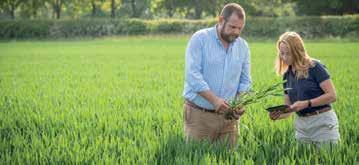
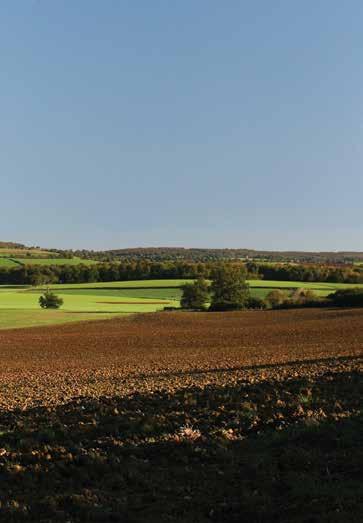
Zero to landfill
“We are a key part of the national crusade to achieve zero to landfill, and our ambition is to increase the quantity recycled to over 70% by 2030.” says Joe. “It is a lofty ambition but a necessary one to help make farming a more sustainable industry,” he adds.
To help reach this goal, Green Tractor is involved in multiple projects to help raise awareness of farm plastic recycling. These include working with other businesses – including Anglia Farmer – to raise awareness of the scheme, working with agricultural colleges to educate the future of farming on the importance of recycling, and
providing agriculture with the knowledge to recycle correctly.
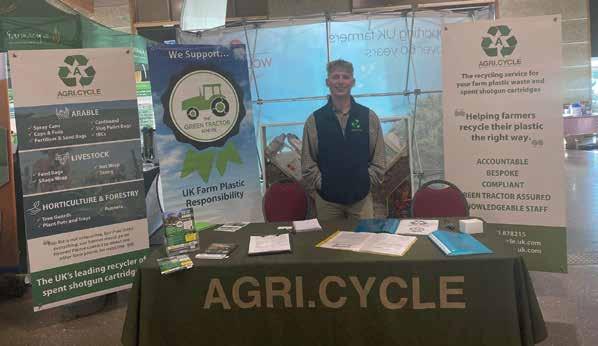
The aim is a sustainable supply chain. Corporate ambassadors in clude Agrii, Asda, Dengie, Shorts Agricultural Services, Smartlift Bulk Packaging, Vanden Recycling, Witham Oil Group, Woldmarsh Producers, Yara and Zeus Packaging.
At Yara, we’re committed to continually reducing our environmental footprint, Yara’s ambition is ‘Growing a Nature-Positive Food Future’. By delivering solutions to meet the planet’s greatest challenges.
Join the scheme:
• 1000s tonnes of farm plastic collected every year.
• 1000s of farming customers already a part of the scheme.
• 80+ recycling sites across the whole of the UK.

• Ambition to ensure all farm plastic is recycled by 2030.
Since 2022, Yara introduced new fertiliser ‘big-bags’, find out more about them here:
Provide audited totals of the quantity of farm plastic collected and recycled
• Further increase the volume and quality of plastic recycled
• Educate farmers to reduce contamination within their waste plastic


• Provide the supply chain with corporate responsibility re plastics they put into the market
• Assist with exploiting new technology for the reprocessing of farm plastic
• Lobby government and other bodies as required for support to increase plastic recycling facilities within the UK

am also a farmer,” says scheme chairman Robert Moore.
Revolutionary scheme
“I know from experience the importance of doing things right on the farm. Being able to be a part of a revolutionary scheme to help farmers recycle the right way is a fantastic opportunity that I am proud to be a part of.”
scheme and through our corporate ambassadors. Funds are all reinvested to improve the scheme. “There is no additional cost to farmers and no levy on new plastic products,” says Joe.


“Being the lead representative for a ground-breaking scheme is a lot of responsibility, but it’s a responsibility I love. It’s great to be out there making a difference for UK farming.”
The key to efficient recycling is the segregation of waste material at source and keeping it dry.
Pesticide cans must be triple rinsed
Seed bags, feed bags and fertiliser bags should be placed inside one another or tied in manageable bundles
Cardboard should be flat-packed and stacked and tied in bundles
Silage wrap and crop cover needs to be dry and free from as much contamination as possible
Trickle tape and irrigation piping must be coiled
To contact the Green Tractor Scheme, call 0800 246 5171 or visit www.thegreentractorscheme.co.uk


With over 100 years of lubricant & paint expertise, we are proud to be preferred suppliers of award-winning oils, greases and other essential products to leading agricultural buying groups, farms, estates and agricultural distributors. distributors
withamgroup.co.uk
www.plugandcool.co.uk
It can sometimes be a bit confusing when it comes to keeping your grain cool. What techniques are the most efficient? How much will the equipment cost? Which system is the best value for money?
The team at Plug&Cool does its best to make life easy for farmers when it comes to cooling grain. All the Plug&Cool products are designed for easy connection across the range. From the energy-efficient grain cooling fans to the multi-zone control panel and all of the accessories in between, everything is fitted with either a single-phase or a three-phase plug. So, there’s no need to call out an electrician to get everything set up.
Richard Speakman, of Sandon Lodge Farm, Sandon, has been using the Plug&Cool system for over three years. The fourth-generation family business farms 826 hectares of cereals and 165 hectares of grass for hay and a spring lambing flock of North Country Mules. Throughout the year, the farm will store over 4000 tonnes of winter wheat, winter barley, winter beans, and spring barley. The Plug&Cool system is the ideal solution for his flat floor grain stores, utilising the higher-powered 2.2Kw aluminium cooling fan combined with twin-walled poly pedestals.
Mr. Speakman had this to say about Plug&Cool: “I would absolutely recommend Plug&Cool to any farmer looking to prepare their grain store for this year’s harvest. We tend to store grain from the summer period right up to Christmas time and into early January. The products are highly durable and more effective than the previous galvanised bottoms and you don’t lose the pedestal base when taking it out! We chose Plug&Cool because they are a local supplier with exceptional after-sales advice and a 24-hour, 7 days a week support service. I think the service they provide, especially in today’s current climate is second to none. As soon as we placed the order with them, everything arrived on time with no delays, and the aftercare service was excellent.”
The poly pedestals have proved to be a great success ever since Plug&Cool began supplying them to farmers across the UK. The new pedestals are now 1.5 meters high compared with the previous model and because they are taller, they have far more ventilation slots that allow for greater extraction of warm air from the grain. As well as being much larger and tougher than their metal counterpart, they are also resistant to any rusting caused by a build-up of condensation in and around the pedestal. Now is the time to start thinking about how to store grain effectively, and one of the easiest and most cost-effective solutions is a pedestal system combined with an energy-efficient, grain cooling fan.
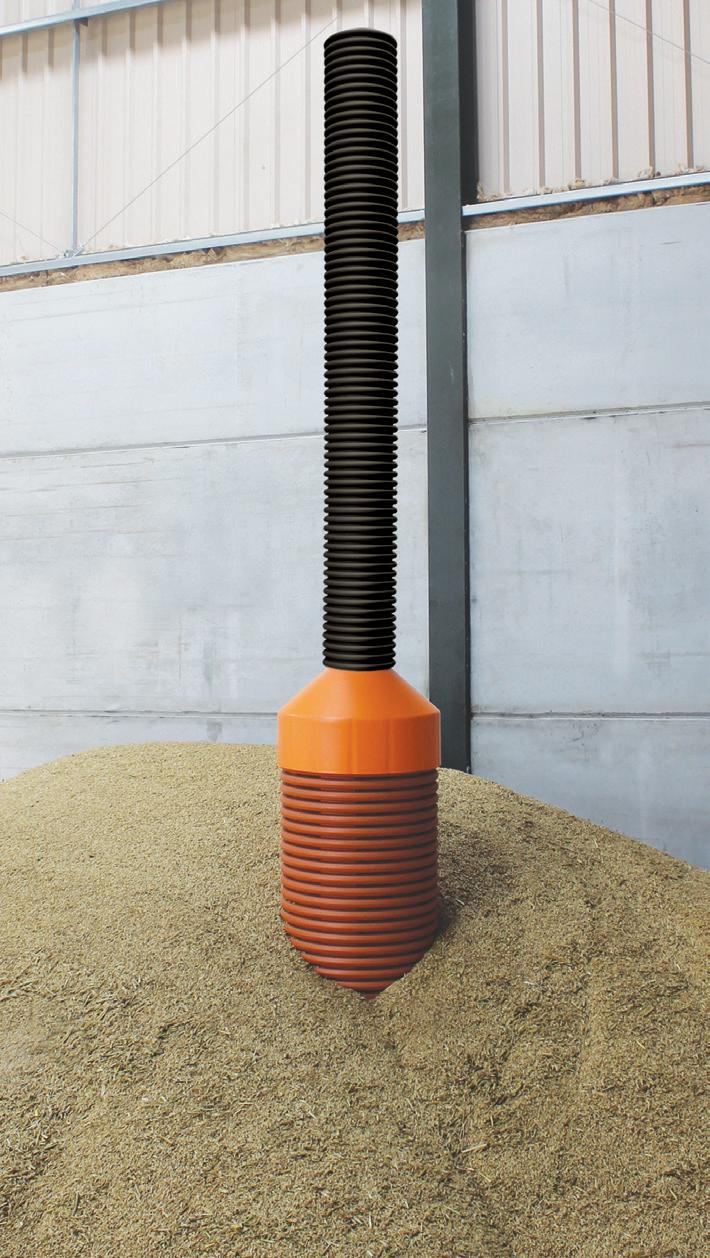
Plug&Cool is now the fastest-growing supplier of grain conditioning products in the agricultural market. With large stocks of aluminium grain fans, poly pedestals and aeration spears, the Essex-based supplier is in the ideal position to support Farmers for this year’s harvest and beyond.


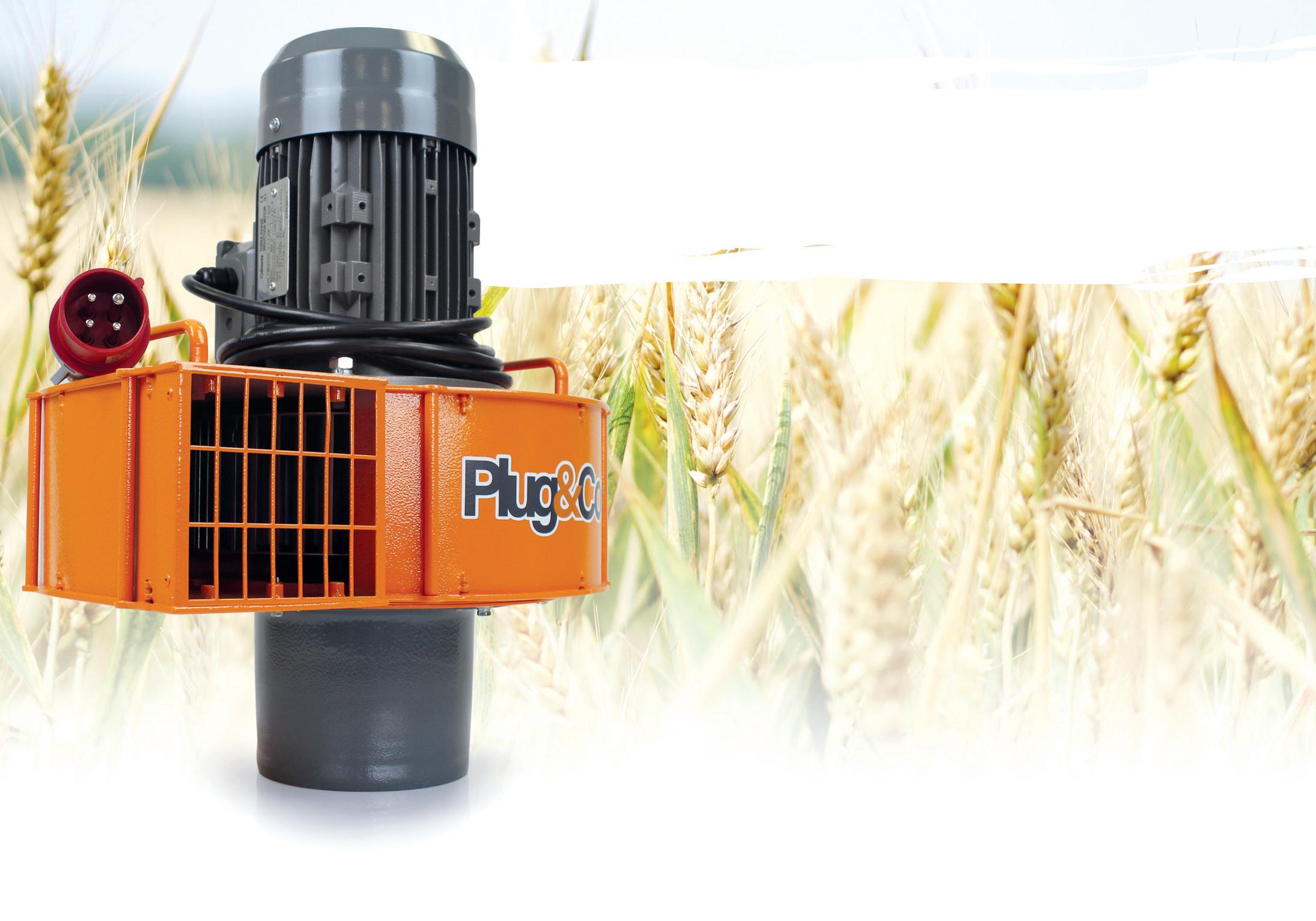


Fastest Cooling Fan
Reduced Energy Costs
Largest Stock Available
Unbeatable Prices
Next-Day Delivery*
Unrivalled Customer Service


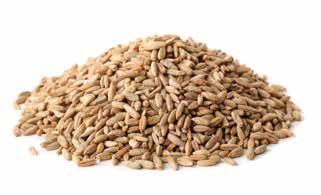



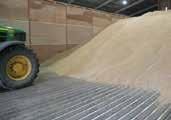



Oilseed rape remains a key option for growers yet to finalise planting autumn planting schedules – despite recent challenges faced by the break crop.
Some growers might decide to take a step away from rape following an uncertain winter period where flea beetle, pigeon damage and the effects of
“Aviron too will remain a key variety with its traits and its excellent vigour in both autumn and spring making it suitable for later drilling.”
New candidate Academic will offer greater gross output and again better northern performance than Aviron, whilst delivering a gross output on par with Attica, says Mr Bouch.

at time of sale and it has very strong scores for standing ability. Sclerotinia tolerance has shown a 15% advantage
DK Expose can offer the same traits as the four suggested Limagrain varieties, however without the advance in yield that both Attica and Academ-
“Clearfield is a simple choice for me as Matrix CL is most definitely the standout performer at this moment in time and tops the ADHB listing for
“Clubroot is likely to be more widely spread again and I think LG Scorpion ticks all the boxes here with excellent vigour and establishment, decent disease scores and TuYV resistance.”
Conventional varieties remain in favour for the home saved seed market. Mr Bouch recommends Acacia, KWS Campus and Annika for those who want the TuYV trait in a conventional variety – although he says it is
“Not having ‘your eggs all in one basket’ should be adhered to where possible and certainly hybrids, my preferred route to both establishment and traits, offer more than one man-
“The biggest single consideration remains the conditions at time of planting. If soils are warm and more importantly there is sufficient moisture, then oilseed rape still provides a
The market for oilseed rape is likely to remain static, says David Bouch

Twin hold roll pin blade removal system and backward leaning air borne upper blade for trash lift and ease of trash flow
Seed depth tail 40mm deep holding the seed at correct depth and placing seed on either side of seed terrace
maximum returns from SFI without losing crop output
SOIL SURFACE
Triton launched its unique deep soil engagement direct drill in 2018 to give plough based yields from direct drilling. 6 years later we are consistently achieving higher yields from the Triton than from ploughed trials on our own land. The Triton is the only all weather seed drill on the market that gives the flexibility to grow maximum profit autumn sown crops whilst reducing blackgrass from late drilling... several manufacturers are now also claiming all weather capability... if these are false claims then the farmer’s new approach will be thwarted.

Downward facing upper blade does not hook grass weed seed up from below stale seed bed and field surface
Triangular tungsten tiles for reduced draught and soil disturbance
draught and soil disturbance
SOIL SURFACE
Drilling at 40mm depth
Downward facing upper blade holds field surface in place minimising soil eruption in the stale seed bed
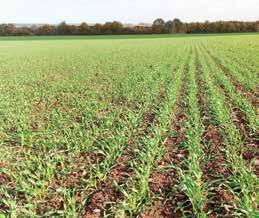
Drilling at 40mm
Downward facing upper blade surface in place minimising soil eruption in the stale seed bed
14cm deep lower blade takes blade deep below ground for air drainage and rooting

Buying a blade drill is now an open and shut case. Why? Because only the Triton drill has a slot closer
lower blade takes blade deep below ground for air drainage and rooting
The ‘must have’ seed drill for exacting
Farmers managing oilseed rape with glyphosate before harvest are advised to use a pod test to make applications at the optimum timing.
Although oilseed rape can aid harvest management by encouraging crops to ripen uniformly, it is important that applications are timed correctly, says Bayer commercial technical manager Matt Siggs.
“First of all, don’t be too keen,” says Mr Siggs. “Applying too early could reduce yield and oil content plus increase the amount of red seed.”
Mr Siggs recommends using a pod test to check the crop. Spray when senescence has begun so check the pods, he says.
“Go right into the crop, not the headlands or tramlines to find a suitable place to sample. Look for an area of canopy which is representative of the field, this may be the main raceme or side branches depending on the crop.
“Choose 20 pods, if in 15 of these pods, at least two-thirds of the seed has changed from green to brown then it is safe to start spraying. If you are a bit below the threshold, come back in three days to check again.”
Perennial weeds can be targeted with the same application. Glyphosate translocates to the rhizome helping to control weeds long-term. A higher rate of 1440g/ha is needed against perennial weeds. If there are only annual weeds 1080g/ha is sufficient.
“Think about how the spray fits in with the weed control programme and the next crop. Fields going into wheat are likely to have a big gap until drilling so the additional weed control can keep stubbles cleaner for longer.”
The aim is for glyphosate to reach all the pods and any green material at the base of the crop;
hence the application needs to penetrate through the entire canopy. A medium–coarse spray is a reliable option for canopy penetration.
In thicker crops, higher water volumes of 200l/ha can improve coverage but always pay attention to the link between forward speed, nozzle choice and optimum pressure to ensure effective application.
Time of day can make a difference. “There is typically higher humidity earlier in the day which means stomata are open increasing glyphosate uptake.”
Harvest interval
“Remember, glyphosate cannot enter the plant without a surfactant so an optimal loading of
Optimising glyphosate application can help harvest management
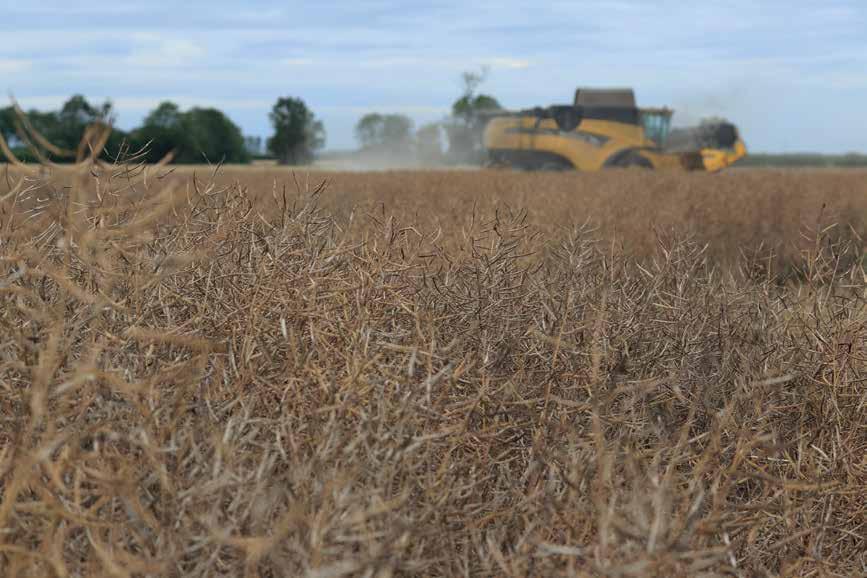
a quality adjuvant is essential. Increasing the dose will not make up for a poor, underloaded formulation.”
Maximise uptake
Modern glyphosate formulations aim to maximise uptake in a range of climatic conditions to give better, more consistent results. High temperatures and thundery downpours are two risks at this time of year which can be mitigated by better formulations.
There is a statutory 14-day interval from spray until harvest, but individual crops may need up to one week longer to fully ripen. Growers should monitor each crop closely to decide when to start combining.
Preparing sprayers correctly will improve desiccation – and make life easier for operators.
Just a few minutes checking over a farm’s sprayer before moving into oilseed rape crops will be time well spent, says John Wooding, technical sales manager at Knight Farm Machinery.
Even application.
“While the oilseed rape area has dropped back, it’s still a significant UK break crop, and desiccation remains the best way of speeding up plant ripening to match seed maturity.”
Good sprayer preparation is critical to ensuring desic-
cants are thoroughly and evenly applied. This means operators should ensure machines are wellprepared if they are to achieve best results.
Tyre pressure
Correct tyre pressure is vital – on the tractor as well as the sprayer if you are using a trailed machine. If you are not using a GPSbased rate controller, also ensure your sprayer is calibrated correctly according to the wheels fitted, says Mr Wooding.
“Make sure belly sheets are in good condition and securely fitted, and that any tines fitted to Continued overleaf
Continued from previous page
removed so crop doesn’t snag.
Boom height
“We repair three or four boom sections each year damaged this way. Check you are using the best nozzles for the job, and have selected the best rate for the product and the density of the crop,” says Mr Wooding.

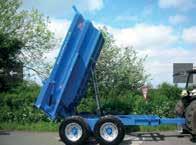

Once in the field, growers should check their boom height is right for the crop. This should be low enough for
Glyphosate is now the only chemical option following the removal of diquat. But growers must remember that it cannot be used on seed crops.
“It’s best to aim for application 14-20 days before harvest. Seed moisture should be at 30% or below for glyphosate application,” says Dick Neale of crop protection experts Hutchinsons.
“Rates of glyphosate need to be robust – at least 1440gms of active, and if using generic products then its important to add in the required adjuvant.
Once work is done, ensure all plant material and residue is cleaned off in the field. Sprayers should be washed externally. Internal cleaning should be thorough, adding a recommended cleaning product at the recommended rate to a tank of clean water.


“This will ensure no desiccant remains, and will also help keep sight gauges clear, as these can become clouded from residue if pod sealant has been used.”
Glyphosate is susceptible to cations in water. This can cause lock up of the active and reduction in the ability for the herbicide to work effectively. Adjuvants have a growth stage cut off for use with 100% dose of pesticide.

“If preferring a non chemical route then swathing is an option – but really only tends to suit crops that are thick and are leaning. It’s important when swathing to keep the swathed crop off the ground to allow for air flow.”
“Of course, if a crop is weed free and very even, there is the option to do nothing and let it ripen naturally. This is useful if there are large areas of oilseed rape to harvest and you are trying to spread out the harvest window.
“But the crop will take longer to ripen which means this is not really an option the further north you go due to the lower temperatures and higher moisture levels.”


DART – A significant step forward in DSV’s reliable, simple to grow, high output oilseed rape varieties.
• High yield and impressive oil content.




• TuYV protection with good tolerance to Verticillium wilt.
• HarvestMax technology to minimise pre harvest seed losses.




• Low biomass variety for early maturity and easy harvest.
Source: AHDB Recommended List (E/W) 2023/24 Phone 01295 757003 www.dsv-uk.co.uk

Straw is too valuable to waste – cover your bales the safe way! Apply

Agricultural Replacement Parts & Accessories

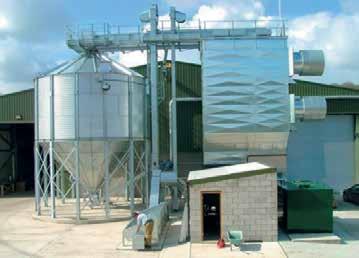
Forage Harvester Spares (all makes)
Rake, Tedder & Mower Parts (all makes)
Maize Header Parts

Kemper, Claas RU/Orbis
Filter Kits for SPFH & Tractors (all makes)
You can stack your bales whichever way best suits you. The top bale, with your Hay Cap on, provides a roof for the bales below.
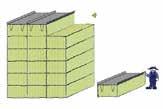
The Hay & Straw Caps are also extremely durable in high winds.
See our website for more information
UK: 07957 125741 ROI: 086 172 5630 or email sales@haycap.co.uk
www.haycap.co.uk
Mark Weatherhead Ltd



Telephone: 01954 210 355 Mobile: 07885 202 005
Hardwick, Cambs CB23 7QL
Claas 492, JD7000 Series, Krone BigX 700, Plus NH FX60 feed roller assemblies & chopping units
01380 850001
Seed specialist RAGT has relaunched its oilseed rape programme with some promising varieties showcased at last months Cereals event.
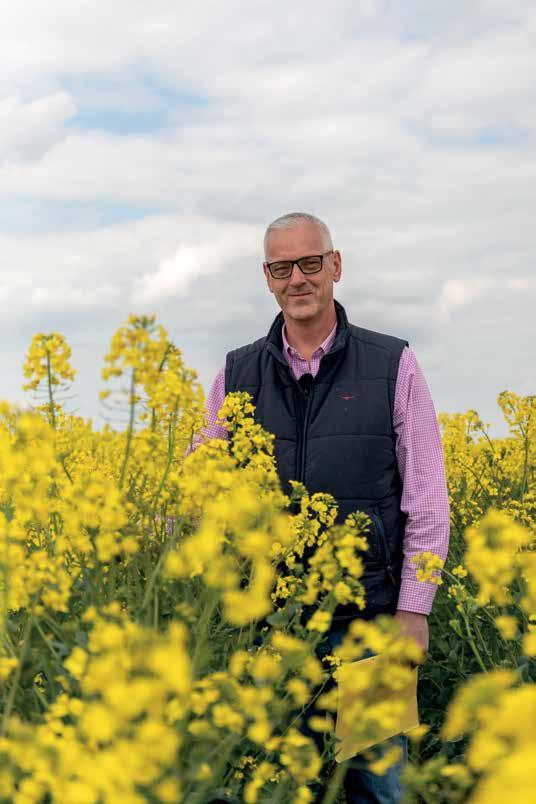
The first two varieties stemming from the programme took centre stage at the two-day event – and both will be commercialised in time for growers this autumn.
RGT Kanzzas is a high biomass variety with early spring vigour and medium early maturity. It is a Recommended List candidate for the East/ West region.
“This is a great package,” says RAGT Seeds managing director Lee Bennett.
“It has amazing light leaf spot resistance, the best of all varieties in official National List trials – no other variety can hold a candle to it.
Phoma resistance
“It has solid phoma resistance and is a real grower, with good establishment and spring vigour. It is short, stiff and early to mature and so consistent for output and pod shatter resistance – it takes some beating.”
The other oilseed rape variety is HRF19240 – marketed as RGT Blackmoon in Europe. Described another growy type, it is currently undergoing NL2 trials in the UK.
“It is stuffed full of yield, grows like nettles, and is resistant to turnip yellows virus. It also has pod shatter resistance. Across Europe last year it didn’t matter where it was, if it wasn’t top it was right up there.
“That to me says one thing: it is adaptable in a wide set of circumstances,” says Mr Bennett.
Limited amounts of seed will be available for both varieties this autumn. RGT Kanzzas will be available through Agrii, with HRF19240 available from ADM Agriculture and Williams Seeds.
Resistance traits
Several very promising new wheat, oilseed rape and barley varieties from
RAGT Seeds are also making their de but, delivering some strong pest and disease resistance traits alongside ag ronomic improvements.
Winter wheat variety Genserus is named for its genetic security – and denotes RAGT’s varieties which car ry the gene that confers resistance to barley yellow dwarf virus.
“The trait offers protection from the day the wheat is planted to the day it is harvested, for less than the cost of a single pyrethroid spray. It great ly simplifies crop management, while benefiting the environment.”
RGT Grouse is the latest in the pipe line of Genserus varieties. This Group 4 hard Recommended List candidate has the added benefit of resistance to orange wheat blossom midge.
Earlier sowing
“This double resistance will enable many growers to produce insecti cide-free wheat, which has obvious attractions within all markets,” says Mr Bennett.
RGT Grouse is a slower developing type, so is highly suited to earlier sow ings when the risk of BYDV is at its highest. It has very good yield poten tial and disease resistance.
“It is a good-looking wheat with prostrate autumn and winter growth and high tillering capacity. It also retains tillers, which lends itself to a denser canopy. Ear fertility is good and the variety has an outstanding bright finish.”
Anticipating keen demand, RAGT has fast-tracked seed production, so limited quantities of commercial seed will be available for autumn 2023.
RGT Orcade is RAGT’s first commercial winter barley. This two-row feed variety is tolerant to BYDV. To have a commercial presence in the winter sector is a very exciting progression for RAGT, says Mr Bennett.
“RGT Orcade is currently in NL2 trials so a couple of years from commercialisation, but it looks promising
Two new rape varieties are available this autumn, says Lee Bennett
and brings a very strong disease resistance package to the market, with high scores against all major pathogens.
“It also produces plenty of grain with a very decent specific weight.”
A new spring barley also features in the form of RGT Eclipse, an RL candidate variety which is up for full recommendation this autumn. This potential brewing barley has the highest hot water extract figure in its group.
Yield is on a par statistically with Laureate, and the variety’s high untreated yield suggests robust in-field resistance to the major foliar diseases. It produces high specific weight grain and matures early.
“It looks a very good variety and not only for the UK – we believe it has pan-European potential too,” says Mr Bennett.
It has amazing light leaf spot resistance

A family-run business for over 50 years, offering an excellent service. We supply high quality, heavy duty Sheep Handling Gates, Mobile Cattle Systems, Mobile Sheep Handling Systems, Stockyards and Calving Gates at competitive prices, delivered Nationwide.





• Single and double tier nests guarantee hatching eggs of the highest quality


• High nest acceptance due to optimum entrance height
• Separate inspection cover for easy monitoring
• Optimum hygiene due to clever, wood-free nest design



• Egg belt with triangular holes reduce egg contact
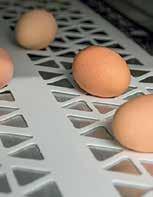

• High egg quality transport of the eggs
Newquip Limited NQ House | Conygarth Way | Leeming Bar Business Park Leeming Bar | Northallerton | North Yorkshire DL7 9EE Tel. 01677 428600 | enquiries@newquip.co.uk www.newquip.co.uk | www.bigdutchman.com

Rapidly increasing changes to farm support means sheep pro ducers should seek profession al advice, say experts.
The removal of the Basic Payment Scheme means almost all sheep farm ers face big changes, says the Nation al Sheep Association. This includes adapting existing production sys tems, diversification and applying for new schemes.
NSA chief executive Phil Stocker says: “With so many changes to farm support being implemented or on the way, it can be challenging for farmers to know which direction to take their business – and which, if any, new scheme is suited to their systems.
Information is readily available for schemes already open for applications, says Mr Stocker.
But the volume can be overwhelming and it is not always clear – so how can farmers ensure they can make the most of what is on offer to them?”
The answer may be using a professional livestock adviser such as a member of the Register of Sheep Advisers (RoSA) – a network of well-rounded professional advisers working within the UK sheep industry.
Advice includes guidance to help sheep farming businesses adapt during and beyond the transition, including ways to join agri-environment schemes and other funding.
The register was established by the National Sheep Association and BASIS Registration in 2021. It directs farmers to advisers with specialisms including business management, electronic reading systems, animal health, nutrition and breeding.
Farm business consultant and sheep producer James Oliver says: “The RoSA network is critical in these ever-changing times with significant shifts in payments and how the government is issuing support.”
Farmers need to embrace change rather than be scared of it, says Mr Oliver. Many produers are already doing a lot of the work needed to receive payments so they should be able to easily tap into these schemes.
“With increasing capital costs in farming, these can help with infrastructure such as fencing and hedging. There are a lot of good advisers out there with practical sheep experience who can relate to their clients and help them to increase their resilience.”
Mr Stocker says the sheep farming sector is likely to be tested by huge forthcoming changes in land use and farm support, driven by global issues
Changes to support mean many producers must adapt the way they farm
of food security and environmental challenge.
“If sheep farmers are going to adapt and succeed, its likely more will want and need advice. Therefore, it’s important there is a network of wellinformed, trusted sheep specific advisers and this was the reason for the formation of this register.
“Taking advice, whether that is on policy change or practical sheep farming matters, should not be judged as a cost but by what benefits it will bring to the farm business.”
For details, visit www.sheepadvisers.co.uk
Anew partnership will see Farmplan livestock software customers upgraded to the Herdwatch platform.
This partnership will upgrade those customers who are currently using Farmplan’s livestock software suite, specifically dedicated to sheep and cattle products such as Livestock Manager, Cattle Manager and Sheep Manager. Herdwatch delivers an integrated, and feature-rich platform. Customers using Farmplan’s financial, cropping or hardware products and services will continue to have access to the same support, as these areas are unaffected by the partnership.
Farmplan managing director Piers Costley said, “Great care was taken to find the perfect
partnership to upgrade our cattle and sheep software customers. Herdwatch is already used on more than 18,000 farms across the UK and Ireland.
“They provide access to cutting edge technology and were deemed the best suited partner on the market. Herdwatch is a natural and logical partner that will equip users with access to valuable cloud integration to futureproof their operations.”
Herdwatch chief executive Fabien Peyaud said: “Our easy-to-use, cloud based solution can be used by multiple users, to access multiple holdings, on multiple devices, making it the perfect solution for Farmplan sheep and cattle software customers.”

Lambs fed a yeast fermentation addition reach target finishing weights fasterr – generating more profit, suggests a study.
Animals fed Celmanax from weaning to slaughter resulted in a £18.91 per head advantage compared to lambs which did not receive additional supplementation, according to data from a 2022 farm trial.
Alison Bond, nutritionist for Rumenco and UK distributor of Celmanax, said the biggest contributor to the increase in profit was a significant increase in daily liveweight gains resulting in faster finishing times.
Half of all supplemented lambs were finished by the end of June, with an additional 35% finished by the trial end. But only 8% of unsupplemented lambs were finished in June, with an additional 17% finished by the end of the trial.
Dr Bond said: “The nutritional benefits from Celmanax allowed lambs to achieve an average daily gain of 530g in the first four
Faster finishing generated an additional £19 per lamb, concluded the study.
weeks of the trial, a 150g advantage over the control group that had an average daily gain of 380g.”
The study involved more than 650 10-week-old lambs on a commercial sheep farm in Wales. Lambs had negative worm counts, were managed on paddocks with a sward height of 9cm (2,500 kg DM/ha) and had free access to a mineral bucket.
Each group was supplemented with creep feed, allocated 1kg/h/day. The control group was fed standard creep feed and the treat-

MOBILE FEED MILLING AND MIXING SERVICES FOR ALL BREEDS OF ANIMALS AND POULTRY
WE PROVIDE MOBILE FEED MILLING AND MIXING SERVICES FOR ALL BREEDS OF ANIMALS AND POULTRY, FROM STRAIGHT ROLLED CEREALS OR HAMMERMILLED PULSES TO COMPLETE MIXED RATIONS AND FEED BIN TRANSFERS.
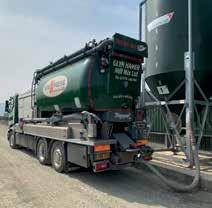
With numerous suction and discharge options including directly into feed bins or separate bunkers, we are able to provide an efficient, traceable and consistently high standard of service for our customers.
Based in the West Midlands we run a fleet of modern ‘Tropper’ machines specifically built for precise mixing and accurate weighing operated by our experienced, friendly drivers.

To discuss your farm’s requirements please give us a call on:
James - 07584 582 598
Glyn on 07976 548766 / 01568 750 183

E: info@glynhamermillmix.co.uk
W: www.glynhamermillmix.co.uk
ment group received creep feed containing Celmanax to provide 0.5g/h/d.

Celmanax is a yeast fermentation additive that has been shown to improve ruminant performance by supporting a stable rumen environment. This in turn improves digestibility and feed efficiency.
The higher financial return from feeding Celmanax was achieved by a combination of fewer days on farm and the lambs earning a higher price by hitting the market early, said Dr Bond.
Improved protein of cereal, reducing bought in protein costs
Better DLWG, finish animals faster and heavier
Improved milk production and fertility
Improved total diet digestibility +5%
Soya free treatment for sustainable diets
Reduced acidosis risk
Maximise profit, improve feed efficiency
UK wide grain processing/treatment
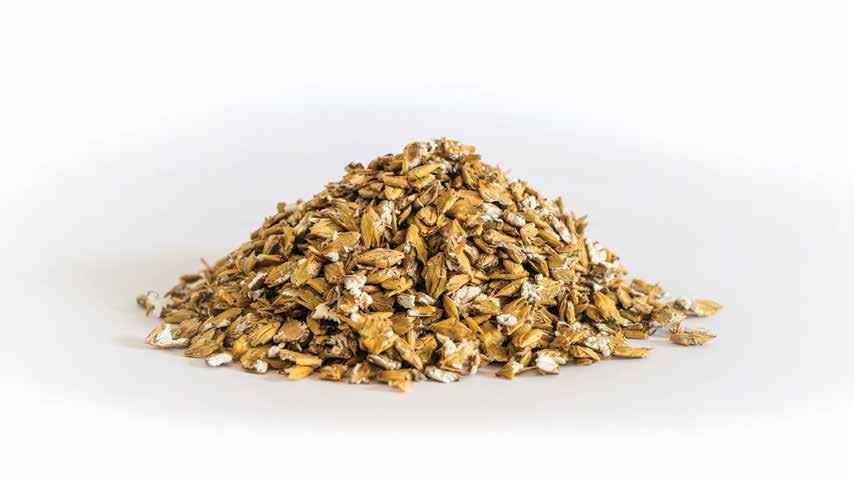
Fully supported by our team of specialists and nutritionists
The only guaranteed complete grain treatment


The government has awarded up to £30 million to cutting-edge farming projects that help to create a more resilient and sustainable agricultural sector.
They include ground-breaking genetic research projects which could reduce methane emissions in cattle by 17%; and a project to produce a reliable UK-grown protein source that can replace soya in human foods.
Funding is expected to be awarded to more than 50 projects. A further £12.5m will fund projects that boost productivity and help farmers produce food sustainably (see panel).
The funding is all part of the Farming Innovation Programme, run in partnership with UK Research & Innovation (UKRI) and delivered by Innovate UK, which is making £270m to fund farm research and development projects.
Defra secretary Therese Coffey said: “Farmers are always forwardlooking, and innovation is key to driving forward a resilient, productive and sustainable agriculture sector that puts food on our tables while protecting and restoring the environment.
Farm summit
“Alongside our new farming schemes, these grants will help to support farmers and pave the way for a technological transformation that will help produce food sustainably for generations to come.”
It follows the Farm to Fork Summit earlier this month where the government announced a package of support for the farming sector, including new measures to ensure the sector remains at the forefront of adopting new technologies and techniques.
The government’s £12.5m ‘on-farm envi ronmental resilience’ competition lets farmers apply for up to £1m for pro jects that drive the development of innovative farming methods.
With a farming focus, projects could find new ways to detect and prevent pests and dis eases; help farmers reduce their fertiliser use; boost soil resilience; and manage threats from extreme weather and flooding.
Scientists and practitioners who are re searching how gene editing and methods such as regenerative agriculture could boost pro ductivity and crop resilience are also encour aged to apply.
UK registered businesses can apply for fund ing until Wednesday 19 July 2023. For details, please visit bit.ly/farm-comp
deliver results
Defra says genetic research could benefit farmers and consumers

“This includes substantial investment to unlock the potential of precision genetic breeding for farmers. Meanwhile, a working group will bring together plant breeders, food manufacturers and retailers to agree an approach that enables these products to reach consumers.
Innovate UK executive director Katrina Hayter said: “The competitions once again demonstrate the sheer breadth and quality of innovation within the UK agri-food space.
“We’re proud to be able to help deliver these funding and partnership opportunities to the sector, bringing together farmers, growers, technologists and researchers in a common aim of making the UK food system more sustainable and resilient.
“Whether improving existing production or introducing novel foods and techniques, the winners have all risen to the innovation challenge and we look forward to supporting their development further.”
The government says that the grants – alongside the government’s new flexible and accessible farming schemes – will ensure that farmers remain at the heart of the rural economy and feeding the nation.
These grants will help to support farmersFunding aims to help develop innovative farming methods that
Anew online skills and learning ser vice is being made available to grow ers and livestock producers who want to further their careers.
The Institute for Agriculture and Horti culture (TIAH) has opened up free access to the test version of the online platform ahead of its upcoming launch to farmers and other industry members later this year.

Designed to support sector workers in fulfilling their potential, TIAH’s service will connect users with training and learning opportunities tailored to their individual sector, role, and skill level.
The online service will locate the best development opportunities for individuals at every stage in their career, helping them review their skills, plot their training journeys, and record achievements along the way.
TIAH is inviting everyone working in farming and growing to road test the beta




user feedback. This will allow TIAH to add improvements and complete the next stage of development of the service.
The institute said it hoped as many people as possible would take up the opportunity to fast-track their professional development while helping the organisation deliver the best possible service to future users.

The online service also offers a range of information about careers in farming and growing to help those already working in the industry, as well as those who would like to. To access the beta online service, visit https://beta.tiah.org/
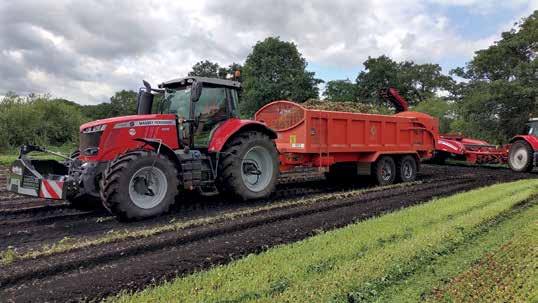
TIAH is the industry’s professional body, enabling everyone working in farming and growing to thrive by providing a personalised gateway to skills, training and career development.
Its aim is to embed a culture of lifelong learning and continued professional development, foster a greater uptake of training and promote agriculture as a progressive, professional, and exciting career choice. For details, visit tiah.org.

















Farmers are being urged to seek private funding support alongside grants to bolster incomes as the basic payment scheme is phased out.

Spanning the majority of the Midlands, water company Severn Trent has offered a suite of funding and support for farmers in priority areas for over 10 years and is pledging to continue to help farmers navigate the agricultural transition through its array of schemes.
Severn Trent agricultural adviser, Mark Biddulph (below) updated Shropshire NFU members on the latest support on offer from the water company. “Severn Trent aims to work in close partnership with the agricultural community, to deliver water quality and farm productivity benefits,” he said.
“There are several key pollutants that, in close collaboration with farmers, we can protect watercourses from, through our array of grant schemes. These pollutants include pesticides, nitrates, and cryptosporidium.”
He outlined that funding is mainly on offer for those in priority catchments, talking through the 48 areas mapped out across the Midlands with an identified risk to water quality from one of the key pollutants.
In the past three years, Severn Trent’s flagship Environmental Protection Scheme, known as STEPS, has awarded £5.6 million of match funding to farmers looking to boost their environmental credentials.

Mr Biddulph explained that this year, the match funding on offer has doubled to a maximum of £10,000 for a vast array of environmental pro jects, while those investing in pesti cide washdown areas can access up to £30,000.
“We’ve awarded over 2,000 STEPS grants to date, and we’re aiming to partner with more farmers and landowners across the catchment,” he said.
“There’s a huge variety to choose from – from newer options like direct drilling equipment and non-chemical weed con trol tools, such as in
ter-row hoes, right through to smaller capital items or even management changes, such as closed pesticide transfer systems, livestock drinking troughs, or reduced inputs.
“Whether you’re running an arable, livestock or horticultural business, there’s something for everyone. Applications are quick and easy, with in-person support available from your local agricultural adviser,” added Mr Biddulph.
Find your local agricultural adviser for more information on STEPS or application support, or apply online by 31 December, by visiting: www.stwater.co.uk/steps.
On top of options that help protect water quality, Mr Biddulph explained the range of biodiversity enhancing items available under, what we call ‘Spring
“This element of STEPS focuses on enhancing farm habitats and biodiversity, providing funding for options such as wildflower margins, pollinator meadows and diverse herbal leys,” he said.
Spring STEPS has a shorter application window, closing on 31 October. Applications also be made online or through your local agricultural
For individuals applying pesticide in priority catchments, Severn Trent also offers a programme known as Swap Your Nozzles, to help maximise spray efficiency.
Mr Biddulph explained that this simple scheme offers a series of BASIS and NRoSO accredited online workshops to update farmers on the latest ways to reduce spray drift and minimise the risk of pesticides reaching watercourses.
“Upon completion of a training session, attendees will be offered a choice of a set of LERAP 3* or 4* low drift sprayer nozzles.
“The idea behind this being that we provide farmers with both the tools and knowledge required to protect the environment, at the same time as reducing spray input costs,” he said.
The final scheme highlighted by Mr Biddulph was a new offering, currently being piloted on livestock farms around South Shropshire, as well as areas of Leicestershire and Warwickshire.
For more details, please visit: www.stwater.co.uk/about-us/ environment/working-withfarmers-and-land-managers/ farming-for-water/
An array of schemes is available

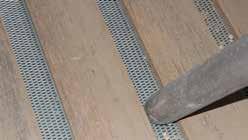






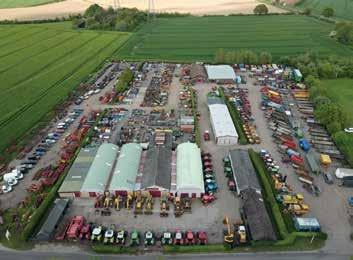
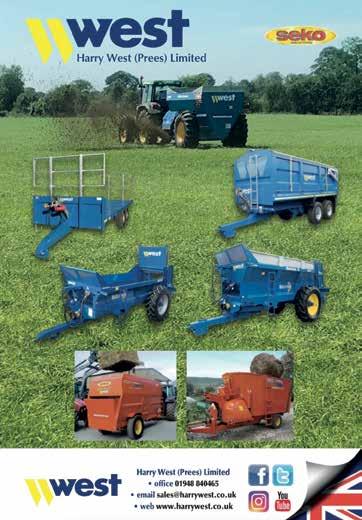
Asix-point farm safety plan has been launched in a bid to avert a repeat of last summer’s devastating season of field fires.
Rural insurer NFU Mutual has joined forces with the NFU and Thames Valley Police to issue fire prevention advice. It comes after record-breaking temperatures and lack of rain turned the countryside into a tinderbox for combines, balers and standing crops.
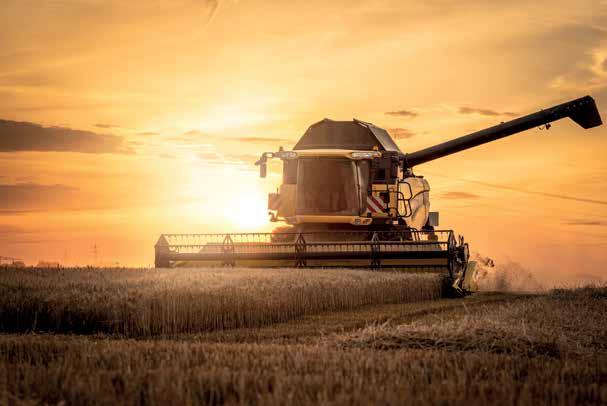
Almost £4m of damage was caused by farm fires last year in the Thames Valley area alone – including Berkshire, Buckinghamshire and Oxfordshire. Other regions were similarly affected, including East Anglia.
Across the Thames Valley area, fire prevention advice and news about the onset of local high-risk weather conditions are being shared by the fire service and the NFU’s text alert network and other social media platforms.
NFU Mutual rural affairs specialist
Hannah Binns said: “Farm fires put the lives of people and animals at risk and lead to huge financial losses, destroyed food and damage to the environment.
“We recommend that farmers increase regular cleaning stops and consider a range of additional fire prevention measures including combine fire suppression systems to reduce fire risks in future hot summers.”
Working together would share expertise and quickly alert farmers to extreme weather conditions, said Ms Binns. This would help to protect farm machinery and encourage farmers to take actions to mitigate the risk of fire.
NFU advice is to keep farm vehicles maintained at all times. This includes combine harvesters which should be cleared out regularly during harvest. It’s also important to keep a serviced fire extinguisher to hand.
Having an emergency plan and staff trained on what to do is also important. This should include instructions
on accessing water supplies, with a water-filled bowser and tractor with plough on hand to create a fire break if needed.
Steve Leonard, group manager for wildfire in the Thames Valley area, said: “Last year saw an increase in fires across the Thames Valley and the UK. Thames Valley Fire and Rescue Services are proud to work with
the farming community to try and reduce incidents of agricultural fires and loss of crop and equipment.
“Even though we had an unprecedented rise in temperatures last year and climate change predictions will see this issue increase in the future, we hope the advice given with NFU Mutual and the NFU will help protect farmers’ livelihoods.”
REGULAR MAINTENANCE
Ensure equipment is clean and maintained before every harvest activity. Regular equipment blowdowns and lubrication schedules can help avoid fires.
HELP THE FIRE SERVICE
Provide the fire and rescue service control centre with what3words from the entrance of your farm and wait for the first appliance.
KNOW YOUR WATER SUPPLY
Ensure any available water on your farm is accessible to fire and rescue crews – including the nearest fire hydrant if available
HAVE A CONTINGENCY PLAN
Use cultivators to put in fire breaks where safe to do so. Have water bowsers on hand and available to extinguish spot fires.
STORE SAFE
Where possible, avoid storing bales near main roads to deter would-be trespassers and arsonists. Store pesticides and fertilisers securely.
CHECK CONDITIONS
Consult the Fire Severity Index before planning harvesting activities. This will help you avoid the most extreme weather zones.
We recommend regular cleaning stops

Spiralling production costs are affecting farmers’ mental health – prompting reminders for growers and livestock producers to take care of themselves.
Some 68% of farmers responding to an NFU survey said soaring input costs – including the cost of energy, fuel and fertiliser – had affected their mental wellbeing. Although some costs have eased, they still remain stubbornly high..

At the same time, 61% of farmers feeel unfairness in the supply chain is negatively impacting their mental health. Almost 50% say rural crime is taking its toll – as evidenced by the rising number of tractor GPS thefts seen in recent months.

The NFU published the data ahead of a parliamentary event to “kickstart the conversation” about the mental health of the nation’s food producers. The global turmoil of the past 18 months had contributed to the challenges faced by farmers, it said.
During the event, MPs had the opportunity to speak to and learn from farming charities and campaigners, helping farmers out in the field day-to-day, and farmers with their own mental health experiences.
NFU vice-president David Exwood said: “Working in the farming industry is one of the most rewarding jobs in the world. But as has been shown by our distressing survey results, the pressures are incredibly challenging too.
“Our survey pinpoints some of the root causes affecting rural mental health – economic and political uncertainty – and we are calling on government to continue taking steps to address these issues to reduce the stress farmers are facing.”
This is backed up by a recent report from MPs on the House of Commons environmental select committee which called for greater joined-up rural mental health planning and action from government, and we agree with these calls.
“While we are starting to see a culture




change within our sector, where talking about mental health is becoming more and more accepted, there are still too many farmers and growers simply ignoring the signs and struggling on in silence.”

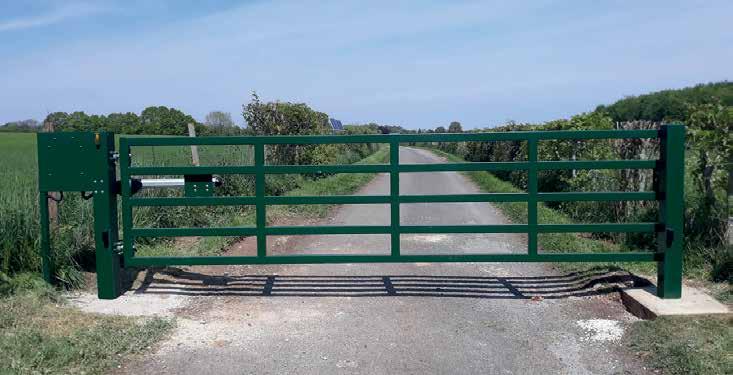
















JOIN US AT BATH & WEST SHOWGROUND 21-22 SEPTEMBER 2023
BE A PART OF THE SHOW
SCAN THE QR-CODE TO FIND OUT MORE ABOUT EXHIBITING
VISITOR TICKETS NOW AVAILABLE
SCAN THE QR-CODE TO BOOK
Aspate of farm thefts has triggered reminders to increase security in farmyards and fields as criminal gangs target GPS systems during the busy summer months.
The cost of GPS theft has gone up 30% in the first quarter of 2023, com pared to the same period last year. Re cent weeks have seen further thefts of GPS equipment, according to the lat est figures from NFU Mutual.
Bob Henderson leads the agricul tural engineering field team at the ru ral insurer. He warned: “It is extreme ly concerning that thieves are taking advantage of increased spring activi ty to identify targets.
“As well as stealing vital equipment, criminals are leaving a trail of damage as they smash glass to gain access and crudely cut wires. Not only is this cost ly, but the theft of GPS kits can hin der farming operations as well as place additional pressures on the business.
“We’re urging all farmers to be on their guard and review and update their security, such as removing GPS equipment when not in use and stor ing it away from the machines. It is also worth taking pictures of the kit and recording any serial numbers.”
DC Chris Piggott, from the National Construction and Agri Thefts Team (NCATT), added: “Intelligence shows offenders are willing to travel the length and breadth of the country to steal GPS kits and immediately export them out of the country.
“There is nowhere that they will not go, and these criminals have been targeting agricultural machinery dealerships as well as farms. It is incredibly important people remove GPS equipment from their machines and store it elsewhere.
“It may seem impractical, but GPS kits are hard to replace and if stolen,
will severely impact a farm’s ability to carry out vital fieldwork.
“I’d also encourage anyone to overtly mark them so that they are undesir-
Activate PIN security on GPS kit with your own unique number if available
If your system is not pin enabled, mark your postcode to deter thieves and trace your property back to you
Keep tractors and combines with GPS fitted stored out of sight when possible
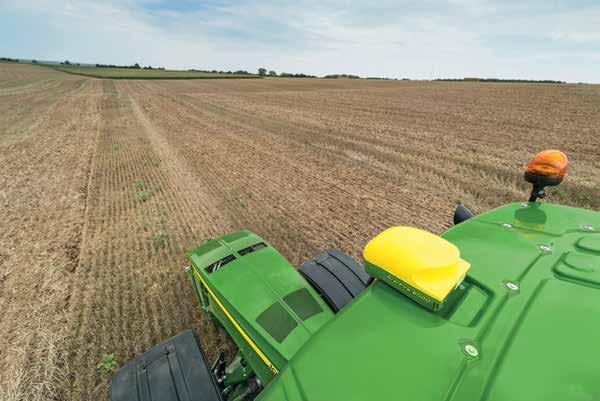
Remove GPS kit when possible from tractors and other machinery and store it securely when not in use
Record serial numbers and photograph your kit Check serial numbers of second-hand kit offered for sale
Farmers battling a rising tide of rural crime amid the cost-of-living crisis are being urged to take extra steps to protect rural property against thieves.
Rural theft during 2022 is estimated to have cost £40.5m – with thieves targeting workshop equipment, all-terrain vehicles and livestock, as well as GPS systems. As the cost of living continues to take its toll on jobs and livelihoods, the theft risk is expected to rise.
Fuel in particular is becoming an increasing target, given that pump prices have risen and the value of red diesel has soared.
Isolated farm buildings and remote farmhouses are especially at risk. Yet research by the farm insurance comparison website Quotezone.co.uk suggest less than half of farmers keep machinery and vehicles locked away.
Based on a sample of more than 6,000 farm vehicle insurance policies, the research shows that nearly 20% of farmers keep garages or barns unlocked, despite their often isolated location, with 15% of vehicles left out on unsecure driveways.
Nationwide farm vehicle data compiled throughout 2022 shows the average value of a farm vehicle in 2022 was £13,250 – making them attractive to thieves.
Artificial intelligence – or AI as it is known – is not something I know much about. And being described as of average intelligence by my school teachers probably disqualifies me from commenting on the fact that the machines are coming.

But if you follow Elon Musk, who warns about the dangers of AI, then maybe it is worth sitting up and taking notice. The multi-billionnaire wants a six-month timeout on the latest AI systems. We need time to breath – even if the machines don’t.
There is nothing new in the idea that technology has arrived with the prospect of doing things quicker and better – and putting people out of jobs. Just hark back to the Swing Riots which accompanied the arrival of the threshing machine in the 19th century.
People rioted – but the idea that threshing machines caused mass unemployment during the Victorian age is ill-founded. It wasn’t so much technology that saw people leave the land as the lure of better paid jobs in newly industrialised towns and cities.
Technology has generally been good for
farming. Who wants to hand hoe sugar beet, for example? Or hand milk cows? These days, AI has already been applied to aid the early detection of pests and diseases – in plants as well as animals.
Then there are images of crops captured by drones and analysed by computer. We have AI-controlled livestock feeding regimes. Driverless tractors haven’t yet been introduced on a large scale yet – but that too could be just around the corner.
But there are real questions to ask. What is a major doubt is who will benefit from the increase in productivity? What happens if all the technology gains are in the hands of a few tech giants, rather than growers and livestock producers?
Will AI destroy more jobs than it creates? Will employment levels fall? The jury is out once again. Numerous surveys suggest millions of jobs could be at risk. But nobody knows for certain.
What we do know is that technology moves at a fast pace. But machines are expensive and farm workers are by comparison relatively cheap. And even if robots don’t fall ill or suffer from hangovers, they can go terribly wrong. And expensively so.
Could robots really replace farm staff? True, they have already replaced human milkers on many farms. But can they calve a cow? Or lamb a ewe? Or replace a broken fuel pipe at 10.30pm at night?
Or blow down dust and straw from a com-
bine engine at the height of harvest? Or weld up a broken sieve? Or push up grain? Or remove a piece of bog oak from a jammed threshing drum?
All these jobs involve so-called basic skills that us workers have developed since the Stone Age. A computer might be able to beat a Grand Master chess champion – but supposedly easier tasks are often better done by mere humans.
Predictions that the average worker would only be required to work 15-20 hours a week have proved wide of the mark. And it is white collar workers rather than blue collar workers whose jobs are most at risk from AI.
Politicians like to embrace the possibilities promised by AI. Listen to technology secretary Michelle Donelan, who says she wants AI to make the UK a smarter, healthier and happier place to live and work.
This is all fine if the technology works. But lose the signal and most of the younger generation cannot keep straight or figure out how to manually drive a beet drill over the top of a hill without any markers.
It’s only then you begin to understand how we already depend on AI in our everyday lives. No doubt the technology is here to stay. But will it create a farm workforce who can mould together and make the farm a happy place to be?
I very much doubt it – but I will let you know when I have worked out how to get the broadband signal back.

For over 100 years our team of experts, have worked side-by-side with farmers to build sheds that help farms perform better. Eternit fibre cement sheets help increase ventilation, reduce noise and condensation, keeping sheds cool in summer and warm in the winter. Creating better environments for healthier livestock.

Connect with the agricultural building experts. Download the new MyEternit app today!
eternit.co.uk

LEMKEN supplies perfectly coordinated, innovative technology for high-yield agriculture. From stubble cultivation to ploughing, seedbed preparation, seeding up to CropCare – well thought-out solutions come from one source at LEMKEN.

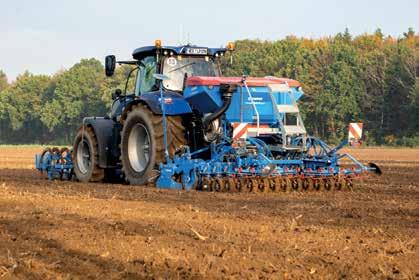
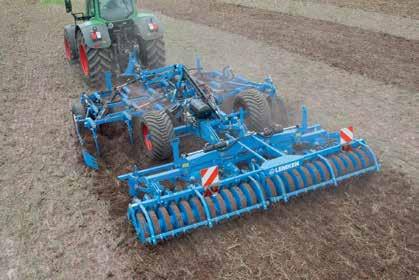
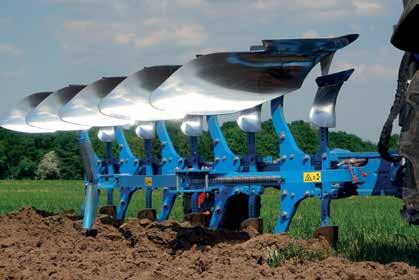
OUR DRIVING FORCE: YOUR SUCCESS!
lemken.com